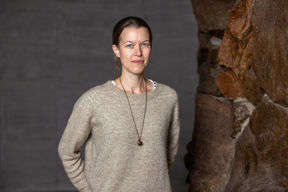Professor Matilda Backholm: Between the micro and the macro

One of the strengths of Aalto’s Department of Applied Physics is research on soft and living matter such as organisms, plants, and surfaces. Matilda Backholm is a new Assistant Professor in Soft Matter Physics, further boosting the Department’s ability and output in this focus area.
Professor Backholm is no stranger to Aalto. She has worked as a postdoc at the university since 2015, and prior to that, went from Helsinki to Denmark to Canada doing research and finishing degrees. Always driven by scientific curiosity, Matilda says she was looking for that leap into something new.
— I saw there was a postdoc opening in the head of the department, Robin Ras’, group. It was at some distance from what I had done before, and I wanted to learn something new. I had worked in different countries with different people and different topics. That’s what drives me: the push to find new ideas to work on. After seven years in the Ras group, I was fortunate enough to start as an Assistant Professor this autumn.
Working between the macro and the micro
Prof. Backholm has developed a new kind of force sensor using a micropipette, essentially a glass tube tinier than a single strand of hair, that allows for the observation and force measurement of organisms with sizes between a few micro- to millimeters. This technique opens an avenue for directly exploring previously inaccessible systems. It makes her and her Living Matter team’s research a first at Aalto, pushing the limits in the world of living soft matter physics.
—We use the micropipette as a force sensor to measure how organisms less than 1 millimetre in length grow or move and interact with their surroundings. I call the systems we work with “mesoscale” in size — they are neither entirely microscopic or macroscopic in terms of scale, but between the two. In this regime, there is a lot of new physics to be discovered. We can, for example, examine the physics of tiny plant roots and see how their material properties and growth dynamics are affected by the soil. We are also looking into how small organisms swim at the mesoscale. To do this, our group is designing and building these force probes that don’t exist anywhere else yet.
The key is patience – and fun
Prof. Backholm advocates a curiosity-driven approach to science: investigate what interests you and see where it takes you. The results can vary from learning how to not do something to game-changers like the unique micropipette technique. It is an endlessly fascinating pursuit, and one that requires a specific mindset.
— One of the key attributes that a scientist can have is patience. Scientific discovery is rewarding, but it takes a certain amount of grit to get there.
Having started in her position only a short while ago, prof. Backholm is eager to get the operation up and running. For her work in the Department of Applied Physics, she has a firm set of goals for the next few years.
— From a practical point of view, I want to have my lab fully operational, hire excellent researchers, and have fun working with them. In terms of science, I am hoping to open up several new avenues of inquiry into how small organisms move, grow and interact with their surroundings. Especially avenues that were previously inaccessible due to a lack of appropriate techniques.
Read more news

Apply Now: Unite! Visiting Professorships at TU Graz
TU Graz, Austria, invites experienced postdoctoral researchers to apply for two fully funded visiting professorships. The deadline for expressions of interest is 20 February 2026, and the positions will begin on 1 October 2026.
Life inside the rock: Otaniemi’s ‘catacombs’ as a living lab for research and education
Building underground calls for research and expertise from many fields. We descended into a tunnel right from the Aalto University campus.
Aalto University Magazine in search of hope
The new issue of Aalto University Magazine is out now. The magazine invites readers to reflect on where hope comes from in a time marked by uncertainty and rapid change.






